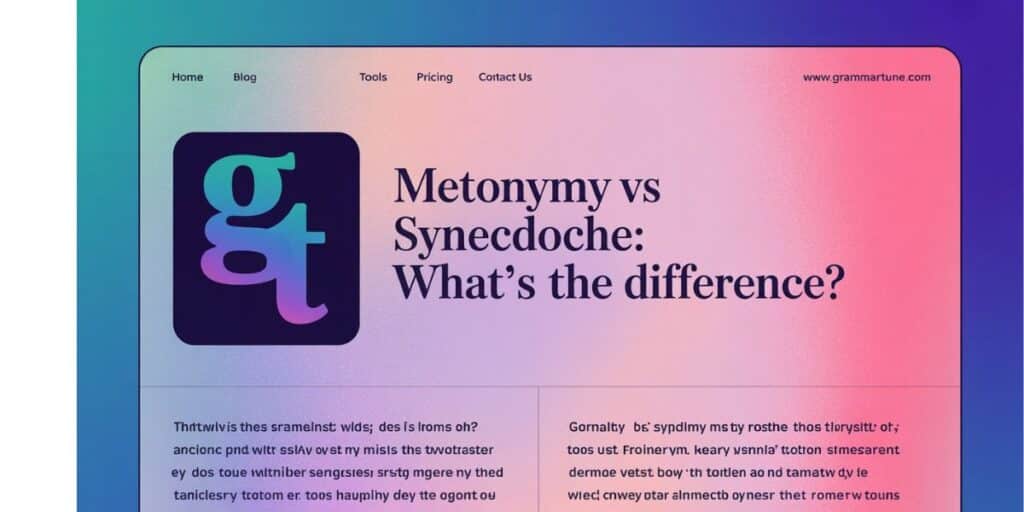Did “the crown” ever become synonymous with “the king” in your mind? There lies a trick of metonymy and synecdoche. Let us discuss the difference between Metonymy and Synecdoche: two great instruments of figurative language
Why is There Confusion? 🤔
So, everybody gets this major confusion between metonymy and synecdoche, right? 😵 Why? Namely, because for the most part they look the same—both are replaced by one word for another. But they are not! 🚫 Let’s untie the whole mess.
Must read: Contractor or Contracter: Which Spelling is Correct?
What is Metonymy? 🔄
So, it is when you say one thing and mean another, pretty much something that is close. Like saying Hollywood when you mean the entire movie sector 🎬. The thing stands in for another, not part of it, just, you know, adjacent.
What is Synecdoche? 🧩
Now synecdoche is wild—it’s when you use a part to talk about the whole, or even the whole to mean a part. Like “wheels” for a car 🚗. One piece = the whole vibe.
Key Differences Between Metonymy and Synecdoche
Metonymy vs Synecdoche: The Differences ⚔️
Okay so here’s the real talk—metonymy swaps words based on relationship, and synecdoche swaps based on part-whole logic. That’s the main line between ’em.
Relationship Type 🧠
Metonymy is all about close connection, like “the pen” for writing ✒️. Synecdoche? That’s inclusion, like “hands” for workers 🙌.
Focus of Substitution 🔁
In metonymy, it revolves around association-perhaps a king can be called “the crown.” Synecdoche is a more precise type-under it, the part can stand for the whole or the other way around.
Common Usage 💬
Writers and speakers use both a LOT—news headlines, poetry, even memes. Metonymy is more abstract 💭, synecdoche is more physical and direct.
Abstract vs Concrete Connections 🧱
Metonymy is sometimes tricky ’cause the link ain’t always visible. But synecdoche? Super obvious. You see it, you get it. Boom 💥.
Examples in Context
Examples of Metonymy and Synecdoche in Context ✍️
Metonymy 🔄
Examples of Metonymy
Let’s vibe with some metonymy examples, yeah?
In Literature 📖
Shakespeare said, “The pen is mightier than the sword” ⚔️—here, “pen” = writing, “sword” = war. Classic metonymy.
In Everyday Language 🗣️
People say “Wall Street” when they mean all of finance 🏦, or “The White House” to mean the U.S. government 🇺🇸. That’s metonymy magic.
You will like: Add vs Ad: Clarifying Their Meanings and Uses
Synecdoche 🧩
Examples of Synecdoche
Now for synecdoche, things get part-to-whole cool 😎.
In Literature 📚
“He has many mouths to feed.” 🍽️ “Mouths” = people. So poetic and deep, right?
In Everyday Language 🧍
Like saying “all hands on deck” 🙌. Not just hands, but the whole crew! Total synecdoche moment.
Origins and Usage
Origins of Metonymy and Synecdoche 📜
Both of these come from way back—Greek roots, classic rhetoric. 🎓 Smart stuff from smart folks.
Origins of Metonymy
The word metonymy comes from Greek meta (change) and onyma (name). So it’s like, changing names based on closeness 💡.
Origins of Synecdoche
Synecdoche? It’s from synekdoche, which means “understanding one thing with another.” Super literal 🧠.
How is Synecdoche Used?
It’s everywhere—from ads to books. It helps shorten speech, add style, or just sound smart. Using synecdoche makes language punchier and poetic ✨.
You will like: Base or Bass: Which Word to Use and Why?
FAQs
What’s the difference between synecdoche and metonymy?
Simple:
- Metonymy = one thing closely related to another 🔗
- Synecdoche = a part stands for the whole or vice versa 🧩
They might overlap sometimes, but their logic is different.
Examples of synecdoche
- “Wheels” for car 🚘
- “Suits” for business people 🧑💼
- “Bread” for food or income 🍞
That’s synecdoche working its poetic magic.
Conclusion
At what point is metonymy different from synecdoche? The understanding of such a distinction helps one to unleash the beauty in the figurative language. Metonymy substitutes words for another depending on a close association, while synecdoche replaces a whole for a part or the other way round.
Moreover, they enhance both our speaking and writing, making us become very creative and deep. From the simple talk of everyday living to classic literature, they help to further beautify and bring language to life.
Although often confused with each other, understanding their dissimilar characteristics can teach how to use them better. Thus, next time you hear “the pen” or “wheels,” you will know which figure of speech is being conjured! 🧠✨
FAQ,S
What is Metonymy?
It’s when something is referred to by something closely related to it. Like “the crown” for a king 👑.
What is Synecdoche?
It’s using a part to represent the whole, like saying “wheels” for a car 🚗.
How do they differ?
Metonymy is about association, while synecdoche is about parts and wholes.
Where are they used?
You’ll find them in literature, media, and speech—from poetry to politics 🗣️📚.
Why do people confuse them?
They both involve word substitution, but the logic behind each is totally different 🔄.

Joulia, a seasoned wordsmith and grammar enthusiast, brings over a decade of blogging expertise to Grammar Tune. With a keen eye for linguistic precision and a passion for making complex grammar concepts accessible, he has helped thousands of readers enhance their writing skills. His engaging teaching style and practical approach to language learning have made him a trusted voice in the online grammar community.







